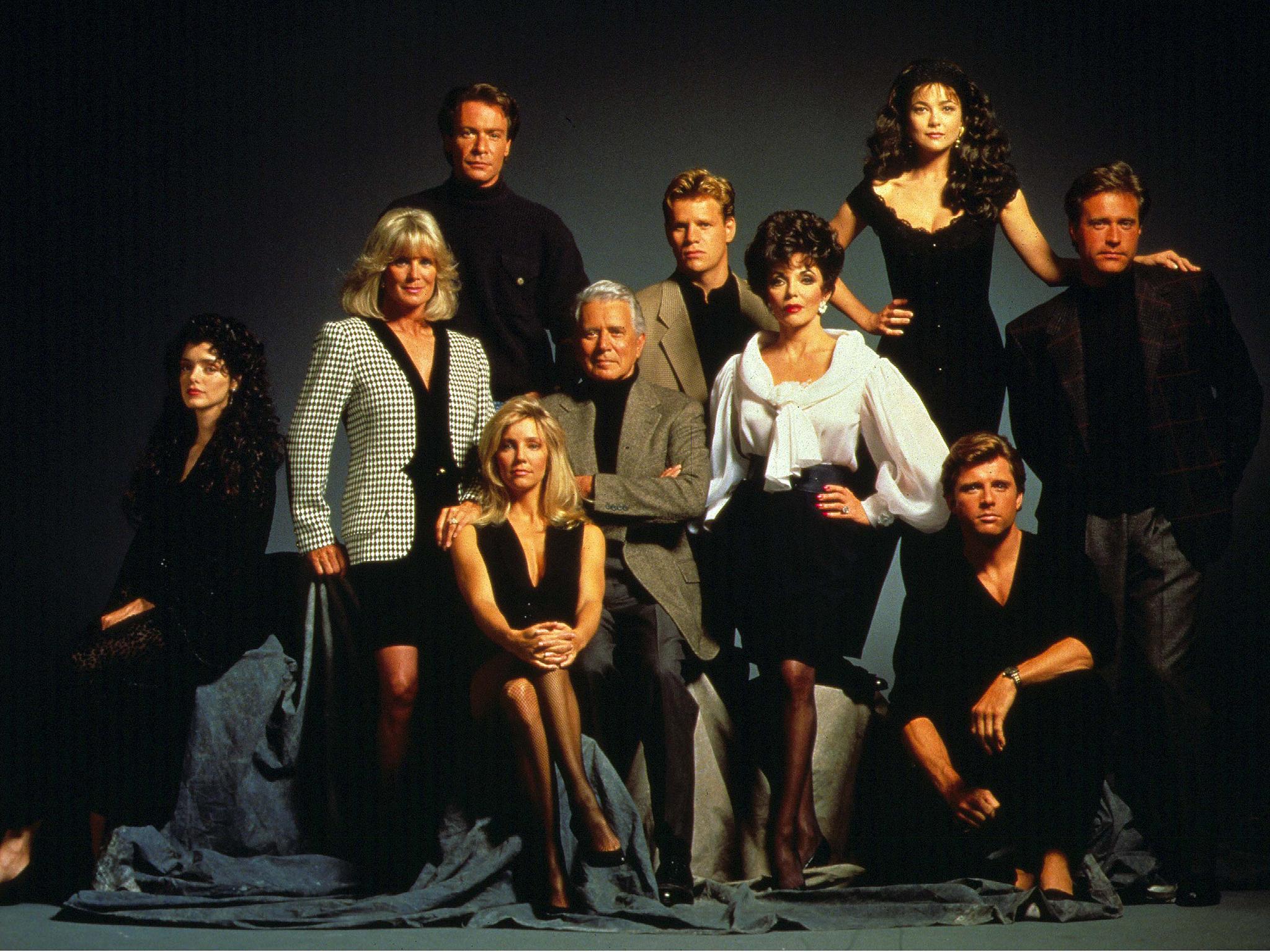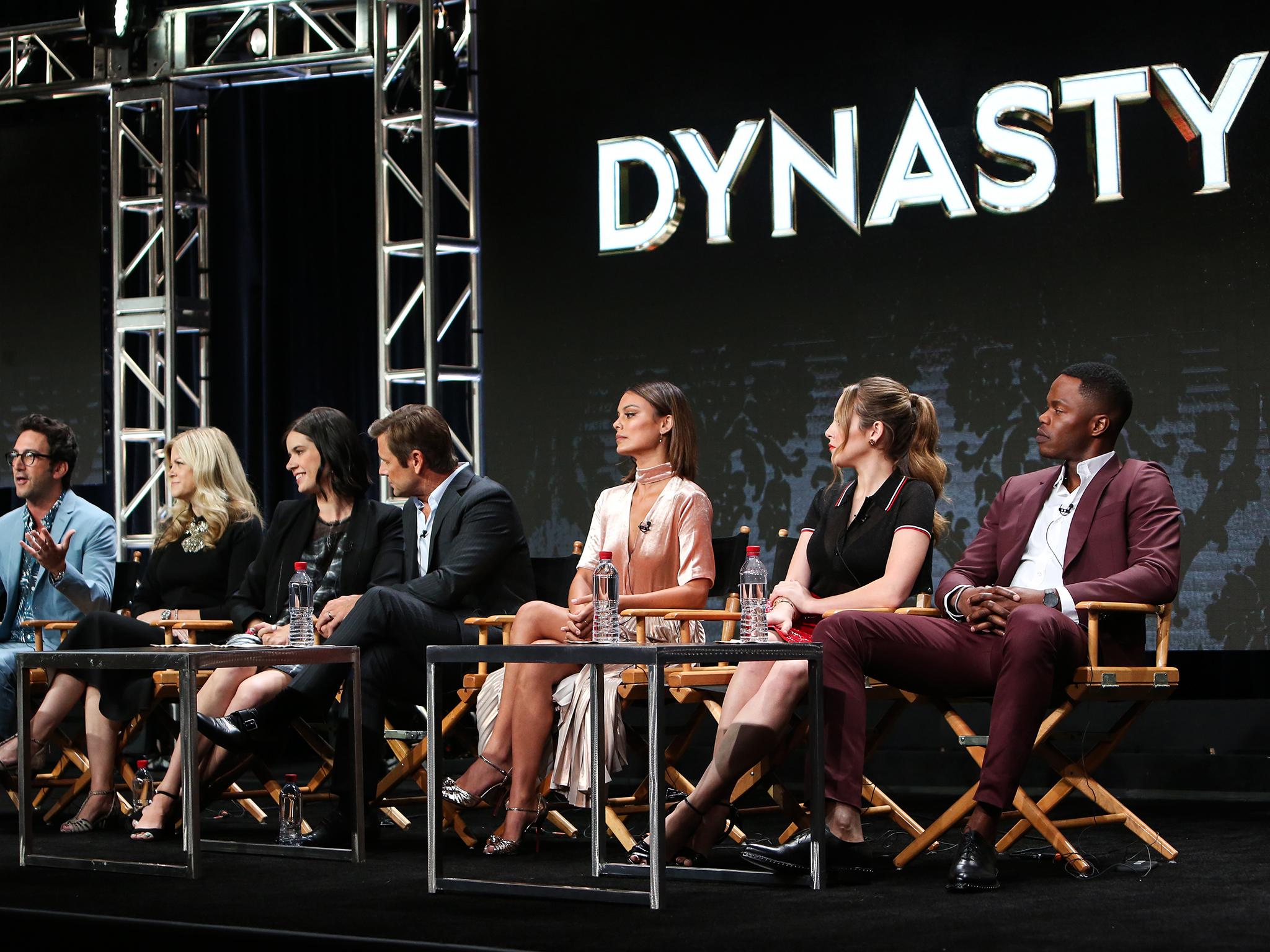The revived versions of Dynasty and Glengarry Glen Ross have a lot to say
The reboots of Dynasty and Glengarry Glen Ross remind us of a time where capitalism was worshipped on both sides of the Atlantic, and prove nothing has changed

“Bad people go to hell? I don’t think so.”
The most famous quote about Eighties capitalism is probably Gordon Gekko’s “Greed is good” from the movie Wall Street, but David Mamet’s Glengarry Glen Ross is littered with lines which rival it, like that one.
The play has just finished a West End run, and along with a reboot of Dynasty, is one of two notable revivals from an era when capitalism red in tooth and claw was being worshipped on both sides of the Atlantic. The Yuppie was born, and the mobile phone made its first appearance.
Mamet’s hardcore devotees would probably blanche at his play being mentioned in the same breath as Dynasty – but the latter was no less iconic of the era from which it sprang.
Given its immense popularity – it was at one point the number one show on US TV and did good business on this side of the Atlantic too – it was arguably even more of a cultural emblem.
The power dressing of its biggest star, Joan Collins, with shoulder pads seemingly modelled on those worn by American Football players, gave rise to one of the Eighties’ most notable trends. Its fans still rave about its soapy depiction of the lives and loves of the 1 per cent, which it fetishised before we knew what that was.
Glengarry, by contrast, focused on those fighting for scraps at a much lower point in the pile; hustlers dreaming of the big score that would punch their ticket to Dynasty’s world.
Their dual resurrection is significant at a time when the hard right once again controls the levers of power in the Anglo Saxon world and is intent upon seeking scapegoats – the EU, immigration, globalisation – for problems that had their genesis in the 1980s.
Just as then, Britain boasts a right wing female Tory Prime Minister, although Theresa May and her crisis wracked administration aren’t in Margaret Thatcher’s league. It’s like trying to compare Manchester United with a pub team.
America, meanwhile, has in the Oval Office a show business outsider of a Republican in the form of Donald Trump. There are plenty of conservatives who still worship at the altar of his Eighties predecessor, the actor Ronald Reagan. Many of them shudder at the way their hero’s easy charm and optimistic tone have been replaced with the boastful bellicosity of the current President.
Optimism has given way to the politics of fear, closed minds, border walls and mining the English channel. Well, that last one hasn’t been suggested just yet. But how long before someone at The Telegraph, Conservative Home, or the Daily Mail floats the idea, and not in jest. A recent article in The Telegraph berated the Germans for allegedly being upset about Britain celebrating the glorious bashing of the Boche in the Second World War. Truly satire is dead.
Which brings us back to the two revivals, and what they have to say.
Glengarry’s hustlers tell each other to “always be closing” as they toil under the tyranny of the targets set by their wealthy bosses, with their results displayed for all to see on the chilly chalk board that must haunt their dreams.
It became a critically lauded movie in 1992, netting Al Pacino an Oscar nomination for best supporting actor for his portrayal of Ricky Roma. For many, Jack Lemmon was the real star with his Shelley “the machine” Levene, one of life’s losers.
The play’s London revival chose to take audiences back in time, and convincingly so. The meticulously constructed sets were full of period detail. The office of the second half featured filing cabinets rather than computer filing systems, and old style desks with old style papers haphazardly strewn over them.
The aforementioned chalk board played substitute to today’s spreadsheets.
Critically acclaimed, Christian Slater took Pacino’s role, portraying an immoral, corrupt and corrupting Ricky Roma.

Slater, at his best playing morally ambiguous anti heroes, suckered audiences into sympathising with a man they really ought to have despised.
His scenes opposite Stanley Townsend, portraying Levene, a character on whom the Simpsons’ hapless Gil Gunderson is modelled, were a delight.
You could easily imagine Roma in today’s Britain as one of the shiny suited pension thieves who descended like wolves onto the steelworkers of Port Talbot and Scunthorpe when they were faced with a Hobson’s choice over what to do with their pension savings as a result of their employer’s financial troubles.
Slater’s performance gave voice to the troubling allure of the conman. He imbued Roma with enough charm and vulnerability to retain audiences’ sympathy, to almost have them rooting for him when they should have cast a pox upon him and his works as he shamelessly exploited Levene in an attempt to turn over his customer and keep his sale “closed”.
Curiously, despite taking us back to the Eighties, the message Glengarry manages to convey is that nothing has changed. The hustlers are still with us, still burning their marks in an attempt to hit the big time and liberate themselves from their bosses’ yoke.
Its nostalgic setting also stood as a riposte to those who would view the past through rose tinted spectacles, as many in Britain, with its increasingly ludicrous Brexit, and the USA, with its “Make America Great Again” are inclined to do.
Glengarry Glen Ross said that the past wasn’t so great and it wasn’t so different. There might not have been any Facebook or Google; no Twitter and no Instagram. But just as now, the times were grim, insecure, and immoral.
The pressures pushing those to behave like the trash in their offices were the same as those that have today led their inheritors to lash out, and put their trust in callous and opportunistic demagogues.
If there is a disappointment in the traditionalism of the play’s setting it is that it denied us the chance to see Mamet’s profane lines delivered by women. Glengarry has always had an all male cast but today’s real estate agents are predominantly female.
If there were ever to be such an update, Dynasty’s break-out star Liz Gillies would be delicious as, shall we say, Ricky Roma?
Of course, Gillies is rather busy with her TV show, the other Eighties revival, although in Dynasty’s case it is described as a reboot, about which the critics haven’t been quite so kind.
Premiering on CW, which has rebooted several shows from its era in the US (and available on Netflix internationally), today’s Dynasty could barely hope to match the influence of its predecessor even if it were a critical smash screened by one of the big networks. It’s hard for any show today to have the sort of reach that the original had back then. The TV market is just too diverse.

It has nonetheless done well enough with viewers to get picked up for a full 22 episode second season.
Interestingly, Dynasty wants to tell us something different to Glengarry. It wants to suggest that there has been progress since its first iteration.
In the original, the groundbreaking Steven Carrington, one of the first homosexual characters on mainstream TV, was positioned as the amoral family’s conscience, just as he is today.
However, back in the day he was depicted as struggling with his sexuality, which created tension with his father, the patriarchal Blake.
The modern Steven is openly and confidently gay. He’s out and proud, and his father more or less accepts it, the conflict between the two instead coming from the son’s liberal politics and environmentalist credo.
His bad girl, bed hopping sister Fallon wasn’t taken seriously as a businesswoman by Blake first time around. Gillies’ rebooted version is still bad, still bed hopping, but is now allowed to strut her stuff as a capable corporate executive.
Her bête noire Krystle, her father’s secretary turned wife, “the pure and moral centre of the show” was allowed only to keep house after marrying him first time around. In Dynasty 2.0 Cristal, named for the Champagne, is the Carringtons’ head of PR, who becomes the chief operating officer of the family business (to Fallon’s chagrin) after their marriage. She’s Latino too.
The show is keen to stress that interracial love affairs are to be welcomed, and, transplanted from Denver to Atlanta, has turned the Colby family, white first time around, into an African American business rival to the Carringtons.
Yes, a lot has changed in this new Dynasty, which weaves real life news events into its plot lines.
But its lead characters are still spoiled and entitled, just as their predecessors were. They’re often whiny, self righteous, and not above playing victim.
The show is still about bitchiness and backstabbing among the 1 per cent. It says that it is possible for you join, but only if you first catch the eye of the boss and then sleep with him. Roma’s big score won’t get him there.
But just as with Glengarry, it also encourages us to sympathise with and root for a nasty piece of work, like Roma, in the form of Fallon.
While Collins’ Alexis held the soap as the villain you loved to hate in the Eighties (the character is scheduled to make a return), Gillies has grabbed a hold of the new version.
It lets the Ricky – and the Ricki – Romas, the Shelley Levenes, and the rest of us, watch the 1 per cent screwing for an hour at the end of a working day in which we may well have been screwed by people like them.
Given the people to whom Britain and America have handed power, it’s perhaps no more than we deserve.
Join our commenting forum
Join thought-provoking conversations, follow other Independent readers and see their replies
Comments
Bookmark popover
Removed from bookmarks